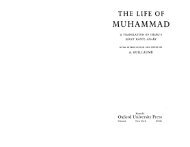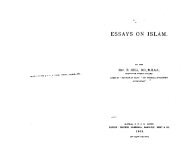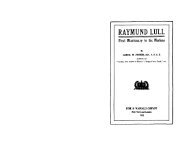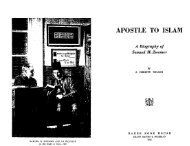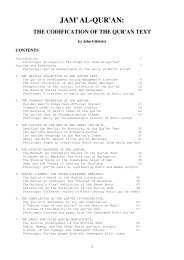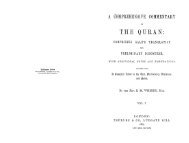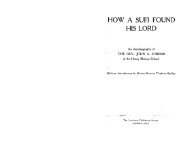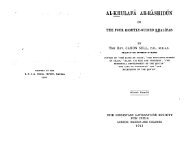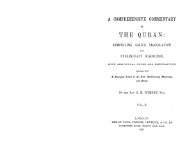Islam Its Belief and Practices - Radical Truth
Islam Its Belief and Practices - Radical Truth
Islam Its Belief and Practices - Radical Truth
You also want an ePaper? Increase the reach of your titles
YUMPU automatically turns print PDFs into web optimized ePapers that Google loves.
94 ISLAM ITS BELIEFS AND PRACTICES HOLY WAR 95<br />
The taxes whieb are imposed upon the conquered<br />
territory are the following :-<br />
(1) Kharaj, l<strong>and</strong> revenue. All the l<strong>and</strong> subdued<br />
by force of arms, if watered by canals cut by<br />
the Gentiles. is subject to tribute. whether<br />
the Imam has divided it among the troops,<br />
or restored it to the original inhabitants; <strong>and</strong><br />
if there be no canals, but the l<strong>and</strong> be watered<br />
by springs, which rise within, it is subject to<br />
tithe, in either case. because tithe is peculiar<br />
to productive l<strong>and</strong>, that is, l<strong>and</strong> capable of<br />
cultivation. <strong>and</strong> which yields increase. <strong>and</strong><br />
the increase produced from it is occasioned<br />
by water.<br />
(2) Jizya, from jiza. to satisfy, to compensate<br />
(because it is compensation for the life of unbelievers),<br />
poll-tax. It is of two kinds: (i)<br />
That which is established voluntarily. <strong>and</strong> by<br />
composition, the rate of which is such as may<br />
be agreed upon by both parties. (ii) That<br />
which the Imam himself imposes, where he<br />
conquers the infidels, <strong>and</strong> then confirms them<br />
in their possessions. This tax is imposed at<br />
the following rate:<br />
(a) Upon every rich person a tax of 48 dirhams<br />
per annum ;<br />
(b) Upon every person in middling circumstances<br />
24 dirhams per annum ;<br />
(c) Upon labouring poor 12 dirhams per<br />
annum.<br />
The poll-tax is taken from Ahl-i-kitab, the people of<br />
the book, i.e., the Jews <strong>and</strong> Christians of all denominations<br />
<strong>and</strong> from the Magi <strong>and</strong> idolaters who are not from<br />
Arabia. Idolaters from Arabia <strong>and</strong> apostates must choose<br />
between <strong>Islam</strong> <strong>and</strong> the sword. Women, children. the<br />
blind, crippled <strong>and</strong> monks are exempt from paying the<br />
tax.<br />
How A Dhimmi Must Deliver His Jizys.<br />
The Jizya must be delivered by the person who owes<br />
it himself; it cannot be sent by another person; but the<br />
person who owes it must himself h<strong>and</strong> it over, <strong>and</strong> while<br />
the Qa9i who receives it, sits <strong>and</strong> strikes him on the neck.<br />
saying: "Give it, O. thou enemy of Allah.<br />
The Position Of A Dhimmi In A Muslim Country.<br />
The Qbimmi must distinguish himself from the Muslim<br />
by wearing different clothes. He is to be kept in a state<br />
of subjection <strong>and</strong> abject humiliation. He must not ride<br />
on saddles like Muslims. When the Muslim st<strong>and</strong>s, he<br />
must not sit. No Muslim ought to show him respect <strong>and</strong><br />
honour. If he meets him in the street he must make him<br />
go aside. They must not live in large numbers in the<br />
midst of Muslims, <strong>and</strong>, if they possess houses of their own.<br />
they must be forced to sell tliem to Muslims. Their<br />
houses muse be lower than those of Muslims. A Qbimmi<br />
loses his right of protection, if his country becomes a l<strong>and</strong><br />
of warfare (Daru'I-Harb) or if he does not pay the polltax.<br />
If he should insult the prophet he is to be killed.<br />
Ghsnimst, Plunder.<br />
When the country of the infidels is conquered by<br />
force, the Imam is at libetry to leave the l<strong>and</strong> in the possession<br />
of the original owners, on condition that they<br />
pay the l<strong>and</strong>-tax (k1laraj) besides the capitation-tax, or he<br />
may divide it among the Muslims. With regard to moveable<br />
property, it is not lawful for the Imait to leave it in<br />
the possession of the infidels, but it must be divided among<br />
the soldiers. Four-fifths of the spoil belong to the troops,



